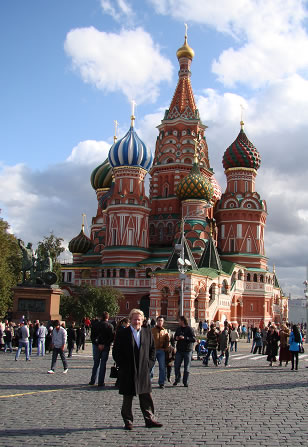
While St. Petersburg is the female of the pairing, Moscow is very much the male equivalent. I had expected a somewhat grim, Soviet inspired city. What I saw was something quite different – Moscow is sheer grandeur. While Stalin’s modelling of the city has left massive buildings dedicated to the rise of the proletariat, the so called “wedding cake” style of architecture, his vast avenues and colossal structures provide a certain majesty to the city I had not expected. When added to that is the Tsarist legacy of the Kremlin, and the many other palaces, churches, museums and opera houses that appear in every space in Moscow, it is apparent that the city is at the apex of European majesty. The yang to St. Petersburg’s yin.
The other surprising thing was the sheer volume of local culture, in particular theatre, that was on offer. A thriving society enjoys an array of cultural choices, and Moscow has one of the most vibrant cultural scenes I have experienced. In seven nights in Moscow we attended five operas and the Bolshoi. That range of program is difficult to attain even in New York. For the record, we saw Rubenstein’s “The Demon”, an evening of Viennese arias, Rimsky-Korsakov’s “Maid of Pskov”, Mussorgsky’s “The Fair at Sorochyntsi”, and Khachaturian’s magnificent ballet “Spartacus” . Of these, Rubenstein’s “Demon” was probably my favourite, an opera well overdue reappraisal in the West. Examples of the Demon’s arias – in which he professes his love for the doomed Tamara – can be found on Dmitri Hvorotovsky’s recent CD “Heroes & Villains”
The indigenous culture is important to the Russians; it is why the streets and pretty much everything else are dictated in Cyrillic rather than Roman characters. I can read Cyrillic, from my days living in Greece, so it’s easier for me, and with a mild dedication to the subject you’ll find it is relatively easy to pick up. Surprising too will be the preponderance of European words – with Latin, German, French or English origin, that say exactly what they mean. CTOП at the end of the road literally transliterates as “Stop”. It’s the same word. Pick that up, and with a reasonably wide range of European languages Cyrillic is relatively easy to understand. The linguistically banal becomes exotic. However, for Russia, surrounded by not always particularly friendly neighbours, the use of Cyrillic acts as both a barrier too and as entry to Russian culture. A Russia signposted in Roman letters just wouldn’t be the same.
Other delights were discovering the food hall in Gum – which rivals that of Harrods in London, the fact that the Kremlin is populated by magnificent orthodox churches rather stern faced Soviets, that Red Square isn’t actually square at all, and that the onion domes of St. Basils are actually independent chapels all bunched together.
Again, the food was rather better than we had anticipated. Russian soups are good for the soul, heartwarming, and occasionally alcoholic, such as the excellent ‘fish soup with wine’ I chose on several occasions. The classic Borscht, with its purple beetroot color, when prepared properly is a joy to behold, savoury, fruity and filling all at once. Another surprise were the mushrooms. In fact, travelling just outside the city a little, exploring the local markets, we found magnificent wild mushrooms on offer together with a preponderance of wild berries. Mushrooms in fact are part of the essence of being Russian, along with duels and the ubiquitous vodka. As are, in Moscow, the magnificently moody skyline that frowns across the city from the Kremlin. One minute bright as if corridors of light are pouring in from heavens portals, the other cloudy as a bad hangover, with mean scurrying clouds threatening to disrupt the very sanctity of the angels. Nowhere is the constant battle between good and evil played out so strategically than in observing the Moscow skyline on an autumn day.
 Under such thoughts a glass of Russian sparkling wine helps lift any moods of depression if the demons appear to be winning, and surprisingly good it can be. Some of the sweeter, cheaper wines are not so clever, but the Russians are rediscovering their vinicultural expertise, and there are good examples of both dry and sweet “Russian champagne” to be had. And even if budgets dictate a less expensive bottle, this can be improved by just adding vodka.
Under such thoughts a glass of Russian sparkling wine helps lift any moods of depression if the demons appear to be winning, and surprisingly good it can be. Some of the sweeter, cheaper wines are not so clever, but the Russians are rediscovering their vinicultural expertise, and there are good examples of both dry and sweet “Russian champagne” to be had. And even if budgets dictate a less expensive bottle, this can be improved by just adding vodka.
Likewise, it pays to sit down in Moscow and take in the works of Chekhov. A slim volume of his assorted short stories is enough, and with a good vodka beside you just take in the essence of Russian culture. Visit the opera – preferably a Russian one – in the evening, and you’ll appreciate just why so many wanted to possess this monumental city. Ponder too, just why those same invaders failed, and you’ll have captured a little of the soul of Russia.